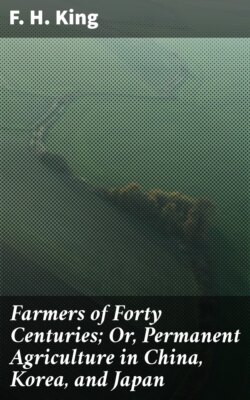Читать книгу Farmers of Forty Centuries; Or, Permanent Agriculture in China, Korea, and Japan - F. H. King - Страница 3
PREFACE
ОглавлениеBy DR. L. H. BAILEY.
We have not yet gathered up the experience of mankind in the tilling of the earth; yet the tilling of the earth is the bottom condition of civilization. If we are to assemble all the forces and agencies that make for the final conquest of the planet, we must assuredly know how it is that all the peoples in all the places have met the problem of producing their sustenance out of the soil.
We have had few great agricultural travelers and few books that describe the real and significant rural conditions. Of natural history travel we have had very much; and of accounts of sights and events perhaps we have had too many. There are, to be sure, famous books of study and travel in rural regions, and some of them, as Arthur Young's "Travels in France," have touched social and political history; but for the most part, authorship of agricultural travel is yet undeveloped. The spirit of scientific inquiry must now be taken into this field, and all earth-conquest must be compared and the results be given to the people that work.
This was the point of view in which I read Professor King's manuscript. It is the writing of a well-trained observer who went forth not to find diversion or to depict scenery and common wonders, but to study the actual conditions of life of agricultural peoples. We in North America are wont to think that we may instruct all the world in agriculture, because our agricultural wealth is great and our exports to less favored peoples have been heavy; but this wealth is great because our soil is fertile and new, and in large acreage for every person. We have really only begun to farm well. The first condition of farming is to maintain fertility. This condition the oriental peoples have met, and they have solved it in their way. We may never adopt particular methods, but we can profit vastly by their experience. With the increase of personal wants in recent time. the newer countries may never reach such density of population as have Japan and China; but we must nevertheless learn the first lesson in the conservation of natural resources, which are the resources of the land. This is the message that Professor King brought home from the East.
This book on agriculture should have good effect in establishing understanding between the West and the East. If there could be such an interchange of courtesies and inquiries on these themes as is suggested by Professor King, as well as the interchange of athletics and diplomacy and commerce, the common productive people on both sides should gain much that they could use; and the results in amity should be incalculable.
It is a misfortune that Professor King could not have lived to write the concluding "Message of China and Japan to the World." It would have been a careful and forceful summary of his study of eastern conditions. At the moment when the work was going to the printer, he was called suddenly to the endless journey and his travel here was left incomplete. But he bequeathed us a new piece of literature, to add to his standard writings on soils and on the applications of physics and devices to agriculture. Whatever he touched he illuminated.
